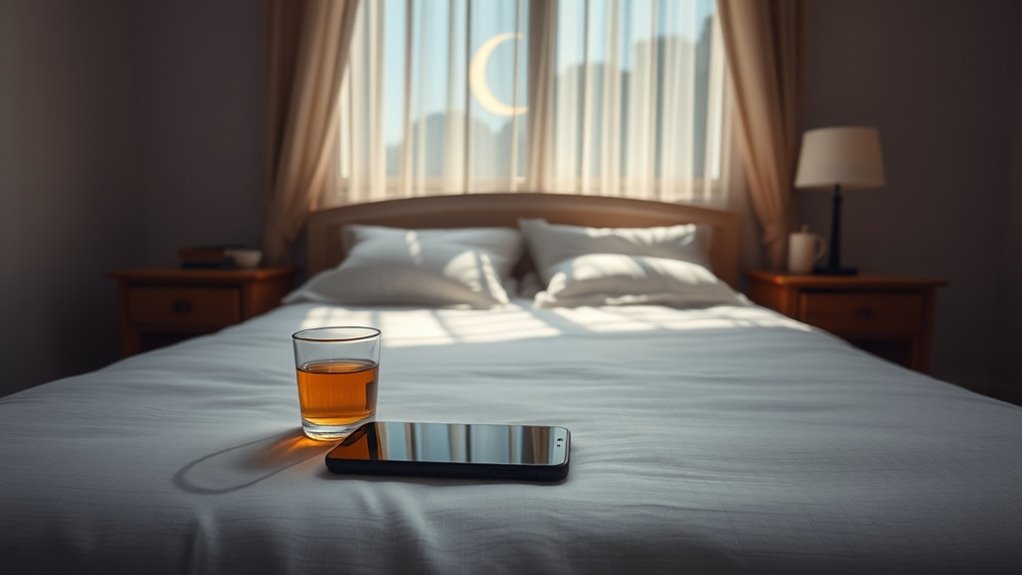What I Do Every Night for Deeper, Peaceful Sleep
While chaos often reigns during the day, creating a peaceful atmosphere at night can transform your sleep experience. Establishing calming routines and making small adjustments can lead to deeper, more restorative rest. It’s not just about what you do before bed; it’s about setting the stage for tranquility. Discovering the right mix of environment and habits can be the key to unlocking a night of peaceful slumber. What steps can you take tonight?
Key Takeaways
- I declutter my bedroom to create a calming environment that promotes relaxation and restful sleep.
- I maintain a consistent sleep schedule, going to bed and waking up at the same time daily.
- I practice relaxation techniques like deep breathing and mindfulness meditation for 10-15 minutes before bed.
- I limit screen time one hour before sleep to reduce blue light exposure and enhance melatonin production.
- I engage in mindful reflection, journaling my thoughts to quiet my mind and foster inner peace before sleeping.
Creating a Calming Environment
Creating a calming environment is essential for achieving deeper, more peaceful sleep, especially when stress or distractions can easily disrupt your rest.
Start by decluttering your bedroom, as a tidy space promotes relaxation.
Consider incorporating soft lighting, like lamps or fairy lights, to create a warm ambiance.
Establish a night ritual that includes soothing activities, such as reading or gentle stretching, to signal your body it’s time to wind down.
Additionally, control noise and temperature, using earplugs or fans if needed.
These small adjustments can transform your sleep space, making it a sanctuary for restful nights ahead. Moreover, establishing a relaxing bedtime routine can significantly enhance your sleep quality and lead to better sleep tonight.
Establishing a Consistent Sleep Schedule
One of the most effective ways to improve your sleep quality is by establishing a consistent sleep schedule. Going to bed and waking up at the same time each day helps regulate your body’s internal clock, making it easier to fall asleep and wake up refreshed. Transforming your sleep can significantly enhance your overall well-being.
| Time of Day | Activity |
|---|---|
| 7:00 AM | Wake up |
| 8:00 AM | Breakfast |
| 10:00 PM | Wind down |
| 11:00 PM | Sleep time |
| 7:00 AM | Rise and shine |
Stick to this routine, and you’ll notice significant improvements in your overall sleep quality.
Incorporating Relaxation Techniques
Incorporating relaxation techniques into your nightly routine can significantly enhance your ability to fall asleep and stay asleep. Studies show that practices like deep breathing, progressive muscle relaxation, and mindfulness meditation can lower stress and promote tranquility.
Try setting aside 10-15 minutes before bed to engage in these activities. Focus on your breath, systematically relax each muscle group, or visualize a peaceful scene. These techniques help shift your mind from daily worries, signaling your body that it’s time to rest. Consistently practicing these methods can lead to improved sleep quality, making your nights more restorative and rejuvenating.
Additionally, establishing a simple evening routine can further amplify your relaxation efforts, creating a serene environment conducive to sleep.
Limiting Screen Time Before Bed
How often do you find yourself scrolling through your phone or watching TV right before bed?
You mightn’t realize it, but this screen time can seriously disrupt your sleep.
Research shows that blue light emitted from devices interferes with melatonin production, the hormone responsible for regulating sleep.
By limiting screen exposure an hour before bedtime, you can help your body prepare for rest.
Instead of binge-watching or checking social media, consider reading a book or practicing relaxation techniques.
Incorporating mindfulness practices into your nighttime routine can further enhance your ability to unwind and fall asleep.
Prioritizing this change can lead to deeper, more peaceful sleep, allowing you to wake up refreshed and ready for the day ahead.
Engaging in Mindful Reflection
After you’ve limited screen time before bed, consider engaging in mindful reflection as part of your winding down routine.
This practice helps quiet your mind and fosters a sense of peace, making it easier to drift off to sleep.
Spend a few moments reviewing your day—acknowledge your accomplishments, feelings, and any lingering worries.
Research shows that this reflection can reduce anxiety and promote emotional well-being.
You might jot down your thoughts in a journal or simply meditate on them. Engaging in this nightly ritual can also help you cultivate inner peace by fostering self-reflection and a positive mindset.





